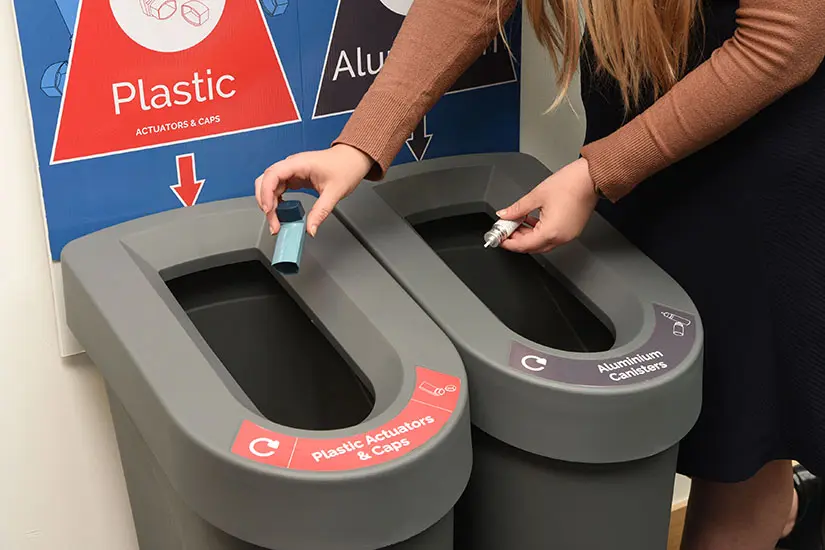Grundon Waste Management has launched the UK’s first proven nationwide inhaler return and recycling scheme – a move expected to deliver significant carbon savings for the NHS.
Inhalers alone are estimated to account for 4% of all NHS CO2 emissions and, with approximately 73 million inhalers dispensed every year, being able to capture those greenhouse gases is seen as an important step towards carbon cutting goals.

By 2026, the health service is expected to deliver a 50% reduction in carbon emissions produced from waste management, according to targets set out in the NHS Clinical Waste Strategy. Between 2028-2032 that figure rises to 80%.
Chris Edwards, Grundon’s General Manager – Technical, said: “This scheme is a potential game-changer for NHS Trusts as they work towards increased carbon savings and net zero.
“Every pressurised Metered Dose Inhaler (pMDI) thrown away is full of hugely polluting hydrofluorocarbon (HFC) gases – a type of greenhouse gas known to be over a thousand times worse than carbon dioxide in contributing to climate change.”
“This scheme safely captures those gases and repurposes them for use in the refrigeration industry, where they are used to replace the need for manufactured gases. And, because we are also recycling the plastic and aluminium from the device, we are making a significant contribution to the circular economy.”
Currently, most inhalers are either thrown away in household general waste or returned to pharmacies for incineration as clinical waste.
NHS Trusts, high street chemists and pharmacies who sign up to the new scheme will have dedicated recycling containers for inhalers installed across their hospitals, clinics, and other healthcare settings, with the aim of making it as easy as possible for the public to participate.
Once collected, these will be processed at Grundon’s specialist recycling facility in Ewelme, Oxfordshire, which is capable of handling more than 200,000 inhalers a day.
The nationwide rollout of the return and recycling service follows successful trials with a number of NHS Trusts and Health Boards across England and Wales.
One of these was Swansea Bay University Health Board (SBUHB), which came on board in February, launching a pilot take-back project for inhaler recycling across eight pharmacies, using patient education and promotional material to encourage people to return used or unwanted inhalers to their pharmacy.
Its aim is to recycle 80% of all prescribed inhalers by 2025 and Oliver Newman, Assistant Divisional Manager, Pharmacy & Medicines Management at SBUHB says there has already been a positive response from patients.
“We’re extremely pleased to be the first in Wales to lead on an inhaler recycling project of this kind; with a positive uptake, we are hoping to roll out the scheme across our own health board,” he said. “The results of our project are going to be fundamental in assisting Welsh Government’s decision for inhaler recycling opportunities across Wales.
“It is estimated that Metered Dose Inhalers currently contribute to approximately 4% of the carbon footprint of the NHS, therefore it is vital that we ensure inhalers we dispense are disposed of in the most appropriate way, such as through recycling methods provided by Grundon Waste Management.”
The Inhaler Recycling Pilot Project used Welsh Government funding to establish the contract with Grundon.
NHS Wales Chief Executive Judith Paget said: “As one of the largest public sector emitters of CO2e, the NHS must act now to reduce its environmental impact and be an exemplar in taking steps to protect the health and wellbeing of future generations.”
Grundon’s innovative inhaler recycling technology has already been used in two previous projects run by major pharmaceutical companies.
The Take AIR (Action for Inhaler Recycling) was a Chiesi Ltd funded scheme supported by University Hospitals of Leicester NHS Trust (UHL) and Leicestershire and Rutland Local Pharmaceutical Committee (LPC). Run between February 2021 and February 2023, the scheme saw 52,148 inhalers returned through the post over a 24-month period.
The project, which took place in community pharmacies and three hospitals across Leicestershire, was estimated to have saved the equivalent of 305.3 tonnes of carbon dioxide emissions from entering the atmosphere.
Grundon also worked with GSK on its Complete the Cycle inhaler recycling scheme, which ran for nearly a decade. In 2018 alone in excess of 3 million inhalers were recycled, saving CO2 emissions equivalent to removing 16,174 cars off UK roads for that year.
Chris Edwards concluded: “These projects and trials have shown there is a clear willingness to recycle inhalers, but the stumbling block has always been how to fund a nationwide collection, treatment and recycling programme.
“The financial and environmental incentives to do more are now there, clearly set out in the new NHS Clinical Waste Strategy. We are confident that NHS Trusts and Health Boards will recognise the benefits this programme can deliver in helping them to achieve these essential carbon reduction savings from waste and work towards net zero.”
Visit our inhaler recycling service page for more information.
